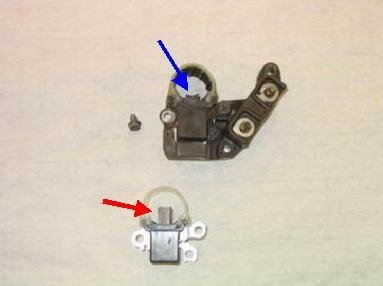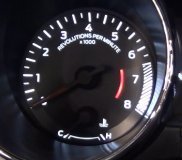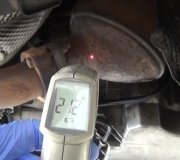First my husband drove it cross country and he began getting a warning light (the temperature one) but the temperature gauge never went past half. The car also lost power and slowed dramatically. He turned engine off and waited about fifteen minutes and was able to continue. This seemed to only happen when in high altitudes (New Mexico and Eastern Arizona).
He returned home Friday with no issues from Dallas to Indy.
I drove the car to Chicago from Indy with no issues the following day. Today, Sunday I began driving home and was only about half an hour into the trip when the engine light came on, the oil warning began flashing, the temperature warning came on and flashed. I pulled over, waited, restarted and pulled off the freeway seemed okay until I slowed on an exit ramp and it went haywire again, including this time the ETC? (Lightning bolt) warning and lost power dramatically, not able to go above thirty mph while limping to the nearest Autozone to get the codes read which I will list at the end all sixteen.
After a Mechanic looked at it, he believed that it was the PCM needing to be replaced (Ugh) but If I drove carefully I could probably make it home. He reset and cleared the codes and the car was fine until I was twenty miles from home when it went even more haywire. ALL warning lights were going on and off, some solid, some flashing, even the gear indicators were flashing, ABS everything! Loss of power was dramatic but this time I stopped for over half an hour with no change. I limped the last twenty miles at about thirty mph with the mileage gauge jumping around, the temperature gauge jumping around and finally dropping and staying at zero, the check engine light, the battery and oil light, the ETC light and the ABS light on, and others flashing and the car dinging (like your seat belt is not on) whenever I had to accelerate from a stop.
Is this the PCM? Should it be replaced? Can we get a reliable used/already programmed one? Need to be sure we get the right part.
also, saw something online that said you might be able to resolve issues by resetting it by removing battery cables holding cables together for ten minutes to drain power, then reconnecting them? Is this worth trying first?
Codes read by two at Autozone and a Mechanic.
u1110, u0101, u100c, u0402, p0481, p0480, u1120, u0140, p0463, u1403, u110e, u0402, p0463, p0700, u0001, u0100
Sunday, July 10th, 2016 AT 7:15 PM



